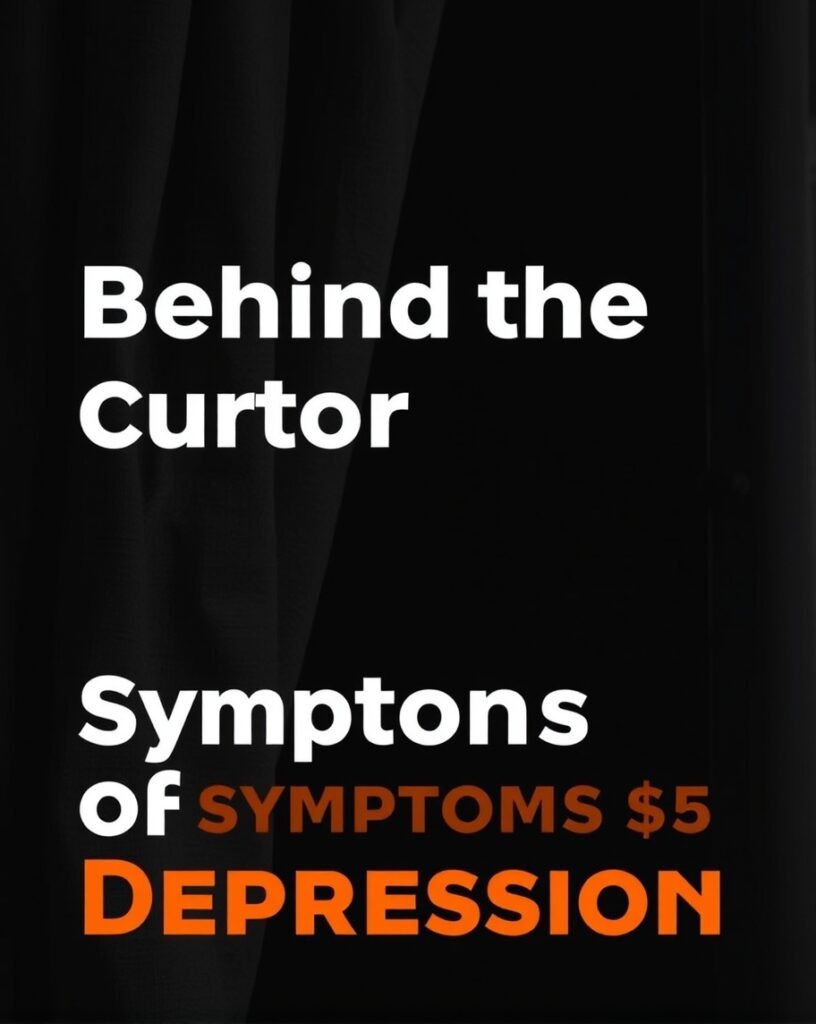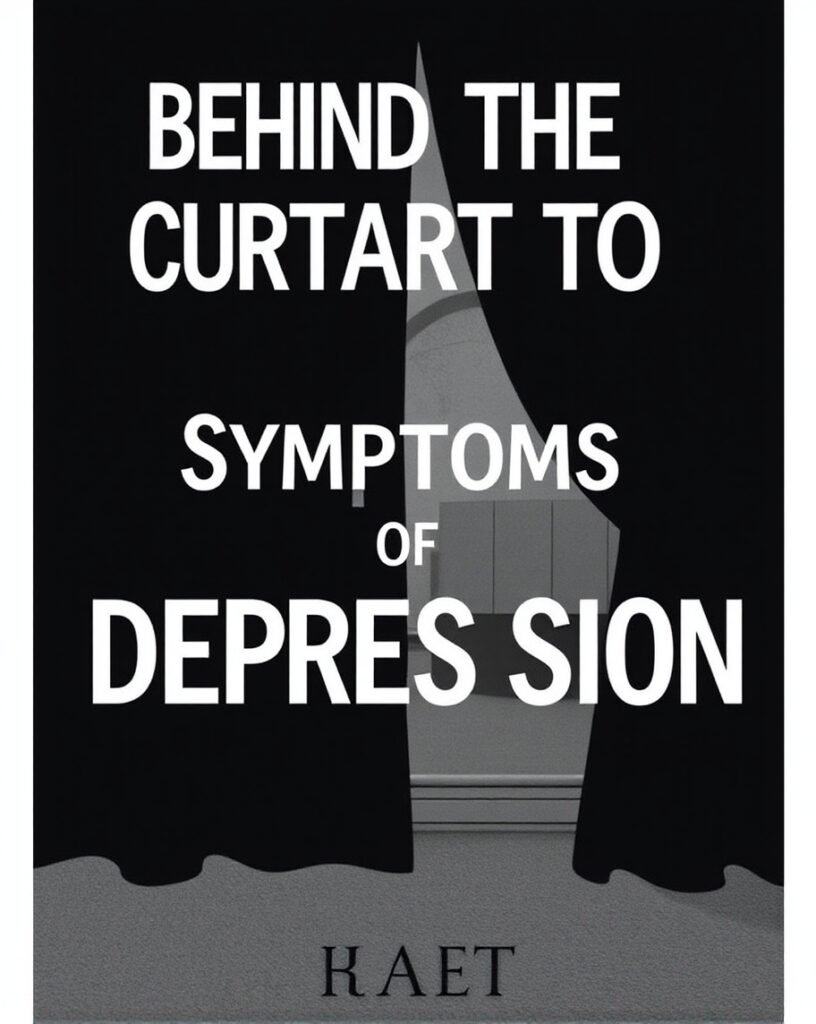Table of Contents
Define depression and its impact significance of feting retired signs
Overview of the seven signs to be bandied

Understanding Depression.
Behind the Curtain of Symptoms of Depression :Description of depression as a internal health complaint Common misconceptions about depression Statistics on frequence and impact
The emotional and physical risk of depression
The significance of mindfulness. bandy why feting retired signs is pivotal
The part of smirch in depression .How mindfulness can lead to early intervention
The impact on connections and communities
In- Depth Look at the Seven Hidden Signs.
1. Changes in Appetite.
Emotional eating vs. loss of appetite Physical health counteraccusations
Suggestions for support and communication.
2. Sleep Disturbances.
Types of sleep disturbances goods on diurnal functioning
Tips for perfecting sleep hygiene
3. Social Withdrawal.
Reasons for pullout goods on internal health Encouraging reconnection with loved bones.
4. Difficulty Concentrating.
Cognitive impacts of depression Strategies for managing focus issues significance of tolerance and understanding
5. Unexplained Physical Symptoms.
Common physical instantiations Understanding the mind- body connection
Seeking holistic approaches to treatment
6. Irritability and Mood Swings
How perversity presents in depression Managing mood swings in connections
structure empathy and support
7. Loss of Interest in Hobbies.
The significance of pursuits for internal health stimulant to engage in conditioning
Reconnecting with heartstrings and interests
FAQs about Hidden Signs of Depression.
Generally asked questions and answers
Providing coffers for farther reading and support
Addressing misconceptions and fears about seeking help
Conclusion.
Recap of the significance of feting retired signs stimulant for open conversations about internal health
Call to action for seeking help and supporting others
Expanded Blog Post Behind the Curtain of Symptoms of Depression unleashing the 7 Hidden Signs
preface.
Depression is frequently depicted as a straightforward emotion — a transitory feeling of sadness or forlornness. still, it’s a complex internal health complaint that affects millions of people worldwide. According to the World Health Organization, over 264 million individualities suffer from depression, and its impact can be both enervating and far- reaching. While numerous are apprehensive of the egregious symptoms, similar as patient sadness or fatigue, there are multitudinous retired signs that frequently go unnoticed.
In this blog post, we will explore the conception of depression and the significance of feting its retired signs. By looking behind the curtain of symptoms of depression, we can more understand the gests of those affected and foster a further compassionate approach to internal health.
We’ll bandy seven specific signs that may not be incontinently honored as symptoms of depression but are pivotal pointers of the condition. By bringing these signs to light, we hope to promote mindfulness and encourage early intervention.

Understanding Depression
Depression is characterized by patient passions of sadness, loss of interest, and a range of physical and emotional symptoms that can intrude with diurnal life. It’s further than just a temporary feeling; it can come a enervating condition that affects every aspect of an existent’s life.
Common Misconceptions numerous people equate depression with sadness, leading to the misconception that those who are depressed should just” snap out of it.” This misreading can immortalize smirch and help individualities from seeking the help they need.
Statistics on Prevalence Research indicates that depression is one of the leading causes of disability worldwide. According to the National Institute of Mental Health( NIMH), nearly 8 of grown-ups experience at least one major depressive occasion each time. This stunning statistic highlights the need for lesser mindfulness and understanding of the condition.
Emotional and Physical Risk The impact of depression extends beyond emotional torture; it can lead to physical symptoms similar as habitual pain, fatigue, and digestive issues. The emotional risk can affect in passions of worthlessness, forlornness, and severe anxiety. Feting these multifaceted goods is essential in understanding how depression operates behind the scenes.
The significance of mindfulness.
mindfulness of the retired signs of depression is vital for several reasons. First, it helps individualities identify their symptoms, which can frequently be confusing or distressing. numerous people may not realize they’re passing depression until it significantly impacts their lives.
The part of Stigma Stigma girding internal health can make it delicate for individualities to talk openly about their passions. People may sweat being judged or misknew, leading them to suffer in silence. By promoting mindfulness and understanding, we can help reduce this smirch and produce a further probative terrain.
Early Intervention Feting retired signs can lead to early intervention, which is pivotal for effective treatment. The sooner someone seeks help, the more likely they’re to recover. mindfulness can empower individualities to take the first step toward mending.
Impact on connections and Communities When we understand depression more, we can support our favored bones more effectively. mindfulness not only benefits those passing depression but also fosters healthier connections and communities. It encourages open conversations and reduces the passions of insulation that frequently accompany the complaint.
In- Depth Look at the Seven Hidden Signs.
1. Changes in Appetite.
Changes in appetite are frequently one of the first signs of depression that individualities may notice. This can manifest in different ways
Emotional Eating Some may find solace in food, leading to gorging. This can give temporary relief but may eventually lead to passions of guilt or shame.
Loss of Appetite Again, others may lose interest in food altogether, performing in weight loss and malnutrition.
Physical Health Counteraccusations Both gluttony and undereating can have serious physical health consequences. It’s essential for individualities and their loved bones to fete these changes and understand that they may be linked to underpinning emotional torture.
Physical Health Implications: Both overeating and undereating can have serious physical health consequences. It is essential for individuals and their loved ones to recognize these changes and understand that they may be linked to underlying emotional distress.
Suggestions for Support: If you notice changes in a loved one’s eating habits, approach the topic gently. Offer to prepare meals together or engage in discussions about healthy eating without judgment. Encouraging them to talk about their feelings related to food can open pathways to understanding and healing.
2. Sleep Disturbances.
Sleep disturbances are another significant hidden sign of depression. These can take many forms:
- Insomnia: Difficulty falling asleep or staying asleep can leave individuals feeling exhausted and irritable during the day.
- Hypersomnia: On the other hand, some may sleep excessively, using sleep as a way to escape their emotional pain.
Effects on Daily Functioning: Lack of sleep or poor-quality sleep can exacerbate feelings of depression, leading to a cycle that is hard to break. It’s important to recognize that these sleep issues are not just habits but can be symptoms of a larger problem.
Tips for Improving Sleep Hygiene: Encouraging healthy sleep habits can help. This may include establishing a regular sleep schedule, creating a relaxing bedtime routine, and reducing screen time before bed. If sleep disturbances persist, seeking professional help can provide effective strategies tailored to the individual’s needs.
3. Social Withdrawal.
Social withdrawal is a common response to depression, as individuals may feel disconnected from others.
- Reasons for Withdrawal: People might avoid social situations due to feelings of inadequacy, fear of judgment, or simply a lack of interest. This can lead to increased feelings of loneliness and isolation.
Effects on Mental Health: The withdrawal can create a feedback loop, where the lack of social interaction worsens feelings of depression, making it even harder to reach out.
Encouraging Reconnection: For those supporting someone who is withdrawing, it’s essential to encourage small steps towards social interaction. This could mean inviting them to low-pressure activities or simply checking in with a phone call or message. It’s important to be patient and understanding, as they may need time to feel comfortable re-engaging.
4. Difficulty Concentrating.
Cognitive impairment is a lesser-known symptom of depression, often leading to difficulties in concentrating and making decisions.
- Cognitive Impacts: Individuals may find it hard to focus on tasks, leading to procrastination and decreased productivity. This can be particularly frustrating in a work or academic setting, where the individual may feel overwhelmed by expectations.
Strategies for Managing Focus Issues: Encouraging the use of organizational tools, such as to-do lists or planners, can help individuals manage their tasks better. It’s also important for friends and family to offer support without adding to the pressure.
Importance of Patience and Understanding: Recognizing that difficulty concentrating is a symptom of depression, rather than a lack of willpower, can foster a more supportive environment. Patience from loved ones can make a significant difference in helping the individual feel understood and valued.

5. Unexplained Physical Symptoms.
Many individuals with depression experience physical symptoms that cannot be attributed to a specific medical condition.
- Common Physical Manifestations: These can include chronic pain, headaches, fatigue, or gastrointestinal issues. The mind-body connection is strong, and emotional distress can often manifest as physical symptoms.
Understanding the Mind-Body Connection: This connection highlights the importance of treating both physical and mental health. When seeking help, individuals should communicate all symptoms to healthcare providers for a holistic approach to treatment.
Seeking Holistic Approaches to Treatment: Encouraging individuals to explore therapies that address both physical and mental health, such as yoga, mindfulness, or acupuncture, can provide relief. A multidisciplinary approach that includes mental health support can be particularly effective.
6. Irritability and Mood Swings.
Irritability and mood swings can be significant indicators of depression, often leading to misunderstandings in relationships.
- How Irritability Presents: Individuals may experience intense emotions that seem disproportionate to the situation, leading to frustration for themselves and those around them.
Managing Mood Swings in Relationships: It’s crucial for loved ones to approach these mood swings with empathy. Open communication about feelings and emotions can help create a more supportive atmosphere. Encouraging individuals to express their feelings can reduce the pressure and isolation they may feel.
Building Empathy and Support: Educating friends and family about the nature of depression and its symptoms can foster understanding and patience. This can help create an environment where individuals feel safe discussing their emotions without fear of judgment.
7. Loss of Interest in Hobbies.
A sudden disinterest in hobbies or activities that once brought joy is a significant sign of depression.
- Significance of Hobbies for Mental Health: Engaging in hobbies can be a vital part of maintaining mental well-being. Losing interest in these activities can lead to further isolation and sadness.
Encouragement to Engage in Activities: Encouraging individuals to reconnect with their passions, even in small ways, can be beneficial. This might mean revisiting an old hobby or trying something new.
Reconnecting with Passions and Interests: Finding opportunities to engage in enjoyable activities can provide a sense of accomplishment and joy. It’s essential to approach this with sensitivity, recognizing that individuals may need time and support to rekindle their interests.
FAQs about Hidden Signs of Depression.
What are the primary symptoms of depression?
Depression encompasses a wide range of symptoms, including persistent sadness, fatigue, changes in appetite, sleep disturbances, difficulty concentrating, and feelings of hopelessness. It’s essential to recognize that symptoms can vary widely among individuals.
How can I help someone who is showing hidden signs of depression?
If you notice someone exhibiting signs of depression, approach them with compassion and understanding. Create a safe space for open conversations and encourage them to seek professional help if necessary. Your support can make a significant difference.
Are there effective treatments for depression?
Yes, there are various effective treatments available, including psychotherapy, medications, lifestyle changes, and support groups. Treatment plans should be personalized to address the individual’s specific needs and circumstances.
Can children and teenagers experience hidden signs of depression?
Absolutely. Children and teenagers may exhibit unique signs, such as irritability, changes in academic performance, or withdrawal from friends. It’s crucial for parents and guardians to be observant and proactive in seeking help if needed.
How can I recognize if I am experiencing hidden signs of depression?
Self-reflection is key. Consider any changes in your emotional state, behavior, and interactions with others. If you notice several signs resonating with your experiences, it may be beneficial to discuss your feelings with a mental health professional.

Conclusion.
Recognizing the hidden signs of depression is vital for promoting understanding and compassion for those affected by this complex mental health disorder. By looking behind the curtain of symptoms of depression, we can create a more supportive environment where individuals feel empowered to seek help.
In conclusion, understanding and acknowledging the hidden signs of depression not only benefits those who are struggling but also fosters a culture of empathy and support. It’s essential to encourage open discussions about mental health, as this can help break down the stigma surrounding the condition.
If you or someone you know is facing these hidden signs of depression, don’t hesitate to reach out for support. Whether it’s a friend, family member, or a mental health professional, help is available. Together, we can create a world where mental health is prioritized, and everyone feels valued and understood.

1 thought on “Behind the Curtain of Symptoms of Depression: Unlocking the 7 Hidden Signs.”